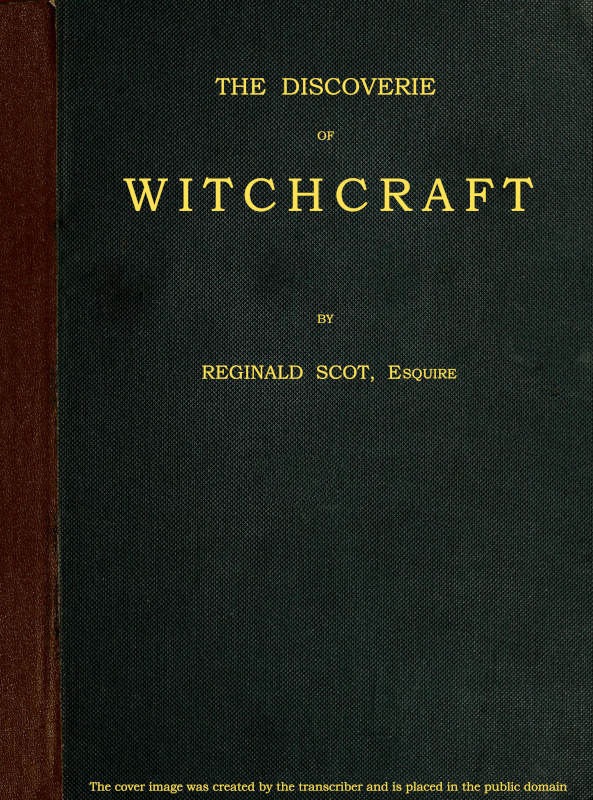The Discoverie of Witchcraft
Play Sample
PREFACE
THIS reprint is not a facsimile of the edition of 1584, for that was in black letter, and its page smaller and of quarto size. Being also for modern readers, and for use, the i of the original has become, where necessary, the j of the second edition; the u and v have been altered according to modern usage, that is, generally interchanged; while the short s replaces the ſSuch modernisations render it more readable by the historical and philosophical student, by the man of science, and by the psychological physician, willing to learn all that may instruct himself and benefit others.Neither would this reprint have been undertaken, unless the work itself had appeared to my friend and fellow-student, W.T.Gairdner, M.D., LL.D., Professor of Medicine in the University of Glasgow,—and led by him—to myself and others, worthy on the above-mentioned grounds, of being reproduced, and as being both in matter and style a valuable English classic.
While, however, it is not a facsimile, yet, excepting such variations as are above noticed, and allowing for the few and trifling errors from which no copy can expect to be free, not even a photographic one, as experts in these matters well know, this will, I believe, be found a correct reprint.Every proof has been thrice, and sometimes oftener, read over with the original by myself, and these efforts have been well supplemented by the intelligence and care of its printers.Even the word-errors of the original, where not in its list of errata, have been retained, though the true or conjectural readings have been given in the margin, or in two or three instances in the Notings at the end.Except also in two instances, where for necessity’s sake alterations have been introduced within []s, and the original given in the margin, the old punctuation has been retained, it being, as a rule, very good, while any slight slips are readily observed, and do not affect the sense. For such other differences as are due to the black letter, and for others like these, I would refer the print-studying reader to the Introduction.
In the biographical portion of this Introduction, besides a supposition or two of my own, which from his writings seem to me highly probable, there have been given notices of his pedigree, age, and marriages, matters hitherto unknown or misstated, and for which I would at once record my indebtedness to Edmund Ward Oliver, Esq.This gentleman having taken an interest in investigating these questions, and being a perfect stranger to me, wrote and offered the results of his inquiries so soon as he had learnt that I was engaged with this reprint, and has since most obligingly answered the various questions that I have had occasion to put to him.A copy of Scot’s Will has been also for the first time published, and some Notes and a Glossary added.Were I to have imitated the learned editors of former days, I should have added, not some, but exhaustive notes on every point, gathered from every known and unknown source; but I have confined myself to explanation, or to making a few remarks on the text, giving also the author’s agreement with, or obligations to Wier, so far as I knew them, and Shakespeare’s and Middleton’s obligations to himself; my reason for not entering into greater details being that I am no student of the pseudo-science of witchcraft, but a student only of what is useful, and true, and good.
It would be unseemly, especially after mentioning Mr. Oliver’s name, were I to close this without acknowledging the kind assistance of my well-known friend, James Gairdner, Esq. , of the Public Record Office; of my Shakespearian friends, W. Aldis Wright, LL. D. , and P. A. Daniel, Esq. ; of that given me by the Very Reverend Father W. H. Eyre, lately Superior of Stonyhurst; by Mrs. Amelia Green; as also by Prof. W. W. Skeat, and Dr. J. A. H. Murray, in my Glossary; though all were, and personally are, strangers; as are Miss Kath. P. Woolrych, Oare Vicarage, Kent, and Miss Ayscough, of Brabourne Vicarage; and especially that given me by my other Shakespearian friends, the Rev. W. H. Harrison, of St. Anne’s, South Lambeth, and W. G. Stone, Esq. My best thanks are also due to Mr. J. J. Jervis for the use, for the printer, of a partially incomplete copy of the first edition; to the University of Glasgow for the loan, for my own use, for the greater part of a year, of another copy of this first edition; and for the use for the same period of a copy of the third edition to my Alma Mater of Edinburgh, endeared to me by the teachings, remembrances, and kindnesses of Sir William Hamilton, Allan Thomson, Christison, Traill, Jamieson, that most sagacious of surgeons and teachers, Syme, and the ever-to-be-revered physician and man, W. Pulteney Alison.
- The pagings, as usual, are those of the first edition.
- P.20, heading, ch.ii, “inquistors”, read “inquisitors”.
- P.92, l.5, 6, “Ulyffes” (bis), read “Ulysses”.
- P.169, l.9, “obsevation”, read “observation”.
- P.192, l.3, “εσιαν”, read “εστιαν”.
- P.334, l.2, from end, “three,” read “three;”.
- P.347, l.6, from end, “left it”, read “left in”.
- P.522, l.6, from end, “Silyllæ”, read “Sibyllæ”.
